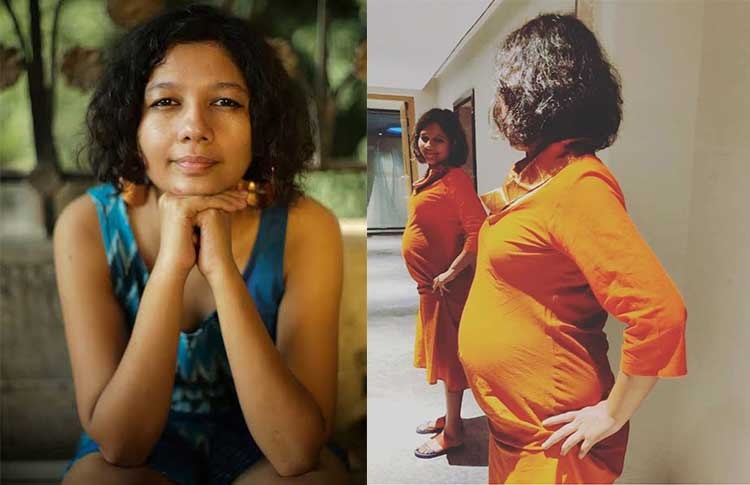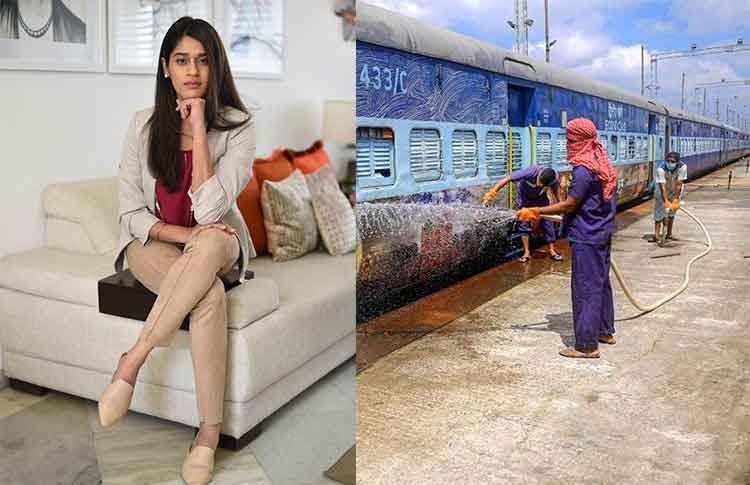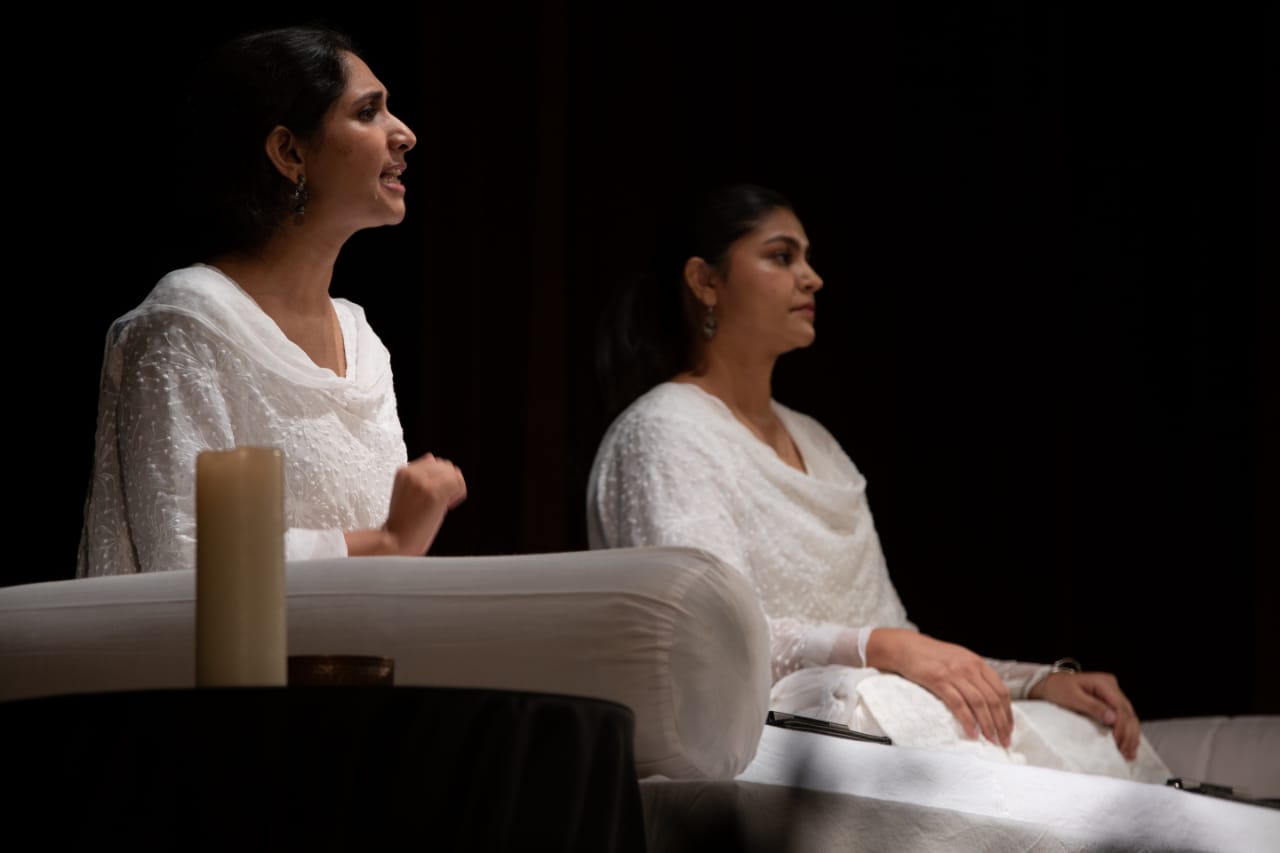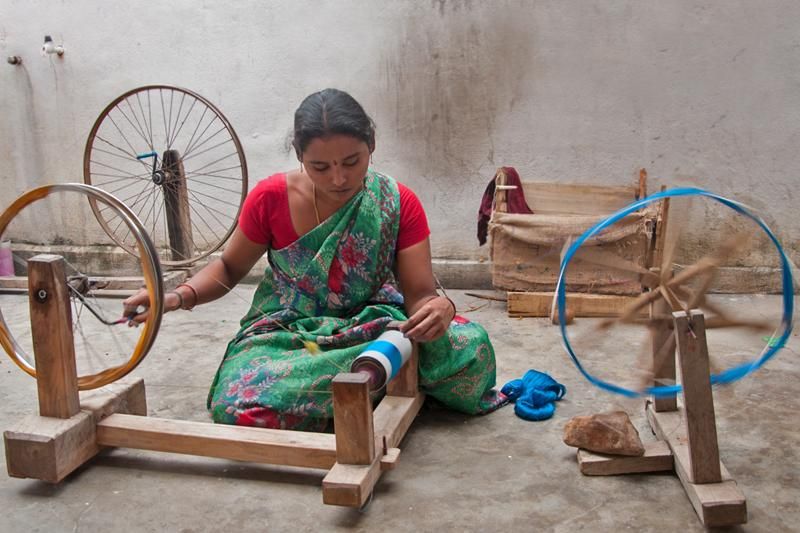Sharon Legrand’s Story: About Adoption Of My Maid’s Daughter With Down Syndrome
- IWB Post
- January 21, 2020

“She really is one of my greatest blessings and if I had to go back and do it all again, I would do exactly the same thing without any hesitation. The love that I get from her is beyond understanding. I feel God chose me to be her Mother and I would not have it any other way,” says Sharon Legrand.
A determined, yet equally compassionate Sharon Legrand’s life story is nothing short of extraordinary. It is not only her life now but of her adopted daughter Nafisa, who has Down Syndrome and is the biological daughter of Sharon’s domestic help.
Sharon has essentially smashed layers of multiple glass ceilings when you just sit back and analyze her situation. Adopting a girl child with Down Syndrome is one thing, adopting the child of your maid another. Add to that Sharon was already a single mother to two daughters when she decided to nurture Nafisa as her own. And yes, she is a Christian who had to clear legalities while trying to adopt a Muslim child, not to mention, she had to put on hold her migration to the USA to be with her husband in order to not leave Nafisa the child behind.
When I first got in touch with Sharon little did I know what was in store. As I sifted through her life’s journey, I was moved and also taken aback. It was hard to comprehend that an ordinary person like Sharon, could with her sheer capacity to love, care and with just her way of life make such a huge difference.
“I do hope that I was able to set an example and looking back I think for me it was not just a question of adopting a Down Syndrome child. It was more about love for another human being and saving the life of this little infant. What was most important was that I could give this child an opportunity for a life that she wouldn’t have had otherwise.”
Yes, Sharon Legrand gave Nafisa the opportunity to live! As baffling and saddening as this might sound, our world sometimes can be a cruel place to live in. Nafisa’s was too. But Sharon listened to the true voice of her heart and took the courageous step of taking responsibility for a child, whose own mother was not willing to keep her.
I talked to Sharon about her life with Nafisa, the adoption, the challenges and more.
About Sharon
Sharon was born in Kolkata in 1960 to Christian parents. Her parents separated when she was eight years old and she lived with her mother for the most part. She studied at Pratt Memorial School but was unable to do her ICSE because they could not afford the fees. She began to work very early in life as a secretary in a multinational company. Sharon has two older daughters from a previous marriage. She met her second husband in 2000 and they got married in 2006. They have been married for 13 years now and her youngest daughter Nafisa lives with them.
Nafisa and Sharon
Nafisa’s mother was a domestic help who would help Sharon with chores sometimes and she would come around when Sharon needed her. She had 4 young children and her husband was an alcoholic who was abusive to her. Her third child was a boy with Down Syndrome and he was about six years old at that time. She took him with her everywhere hoping that people would help her with food and money. One day in November 2003 she visited Sharon and she had this tiny little baby.
“I thought at the time, she would have been a few days old. She looked really sick and smelled terrible. I asked her about this child and she began to cry and said that she was unable to take care of her because she didn’t have the money to pay for medical aid and everybody was telling her that the child was possessed by a demon because she had Down Syndrome. The child was three months old. She had been taking the child to witch doctors and priests and doing everything they told her from burning her with an iron ring to sitting her in an iron bucket of icy cold water in the month of November and even feeding her things that the witch doctors would give her to get rid of the demons. The child was barely breathing and it tugged at my heartstrings. I took the child in my arms and she looked up at me and it was absolute love at first sight,” tells Sharon.
“My first instinct was to offer to take her to the doctor but the mother was very reluctant to do that. She just didn’t want the child. So, I offered to take the child myself to the doctor and to keep her with me till she was better. She immediately agreed and left the child with me and left. I didn’t see her again until two weeks later. In the meantime, I took her to the doctor and was told that the child had rickets due to malnutrition, third-degree burns all over her body, severe gastroenteritis and full-blown pneumonia on top of having Down syndrome, and the doctor actually advised me not to take the responsibility because she didn’t feel that she would survive,” she paused, witnessing the invisible pictures of the old memories.
“She very rarely cried because the cough was so bad. We named her Nappy because it seemed like every few minutes, we were having to change her diapers because of her gastroenteritis. We called her our little Chinese kewpie doll. Two weeks later her mother came to see her but was not interested in taking her back even though she was doing so much better. So, I kept her and a few months later she was doing really well and so the doctor told me that I could finally bathe her rather than the sponge baths I was giving her. While I was bathing her I found that there was cotton wool in her private area and so that day I took her back to the doctor to find that the child had been molested. She was put on more antibiotics for the infection which was the reason for the bad smell that came from her. By this time, I had decided that I was definitely not giving her back and talked to her mother about adopting her as my own. She agreed. At that time, I was communicating daily with the man who would become my husband and when I discussed it with him, he agreed that adopting her would be the right thing to do. We decided to name this beautiful little girl, Nafisa.”
The Adoption Process
“I did face a lot of challenges once we decided to adopt Nafisa. I did not know the law for adopting, met greedy lawyers, and most of all that adoption centers and even the Missionaries of Charity were not willing to help or even give advice. One of the hardest things was that since I was already thinking of moving to the US I had to worry about immigration. Adopting an Indian child in the US was really hard at that time because it required the US citizen to physically live in India for a certain time period before the adoption could be finalized, which was not possible for my fiancé as he worked for the US military. So leave was an issue. Therefore, I decided that until I legally adopted her, I was not going to get married or even try to move to the US. My husband was good enough to understand my decision,” one could hear soft tones of deep gratitude in her voice, however, a moment later it sounded stern and agitated.
“The first lawyer that I went to told me that adoption was not required and that all I needed was Legal Guardianship. He then proceeded to charge me a huge amount just to get a Legal Guardianship. Once that was done, I found out that it was only valid if I wanted to financially support the child. It didn’t give me any permanent custody of the child. So, I began to go around and around in circles with multiple lawyers who really didn’t know the law for adoption. It turned out that apparently there was no provision for a Christian single woman to adopt a Muslim child in India. Or, that’s what I was told. In 2006, my husband and I decided to get married so that we could look for adoption as a couple but I was still not willing to file immigration papers because I could not and would not leave this child behind. But God moves in mysterious ways and this was God’s way of providing a miracle.”
“We decided to go to Kalimpong and visit Dr. Graham’s Homes to meet a friend of mine. While we were there, I decided to work at the orphanage as a resident cottage mother taking care of a cottage of rowdy little boys. My middle daughter and Nafisa were with me and I met a lot of people there but most importantly, one of the children in my cottage was the nephew of a lawyer and the grandson of a Judge. When they heard my story about the troubles I was having trying to adopt Nafisa, they immediately jumped in to help. Four days later I came back to Kolkata and in two days I was able to legally adopt Nafisa. Soon after we filed for immigration to the United States, which was long drawn out and tedious, we managed to move to the United States in July 2008. It took me five years but I did it and I am so grateful to those amazing people who helped me. In August of 2011, my husband was finally able to adopt both my daughters and Nafisa. And Nafisa became Nafisa Rebecca Legrand, legally an American citizen,” another sweet pause hung silently as if we both were trying to catch the whispers of moving air in the room.
A child with Down Syndrome
“As for Nafisa having Down Syndrome, it became a challenge trying to find educational programmes in Kolkata that would help her with early intervention. I did find one school that agreed to admit her at two and a half years of age. The school was open to children of all ages and disabilities, but Nafisa was the youngest and only child with Down’s. And while they were wonderful teachers, they didn’t have a programme that focused on her specific needs. And the space was too small to accommodate so many children with special needs so it was chaotic to say the least. I did, however, get to meet many amazing mothers and learned a whole new way to parent. The greater challenge of being a parent of a Down’s child was the developmental delays. Relatively simple tasks for other children took much longer for her grasp or accomplishment. But Nafisa has a very independent spirit and can be tenacious in her efforts to achieve goals. In all, this gives greater meaning to the day to day victories that parents often take for granted. As a single parent, I found it more challenging to parent my other daughters than Nafisa.”
Sharon also feels that education is the best way to spread awareness about Down Syndrome and give people an understanding of these amazing children and adults. She says, “We need to understand that just because a child is born with an extra 21st chromosome, it does not make them any less human. It does have its challenges but those challenges are often balanced by an extraordinary and childlike capacity for love that too many of us grow out of.”
The Joys that Nafisa brings
“Where do I begin to tell you about the joys that Nafisa brings to me? There are just so many things she does or says that make everyone around her so happy and loved. The most amazing things about her are her compassion for both people and animals, her independence and determination, her absolute love for music and dance, her unapologetic self-expression and most of all her ability to love and be loved. She is one of the most compassionate human beings I have ever met. If someone is feeling sad or hurting, she will go out of her way to help that person feel better with hugs and smiles or even just holding hands. Animals and people alike just adore her and the joy she brings to everyone fills me with so much love for her. She is fiercely independent and would prefer to do most things by herself if she could. Her teachers are always so amazed by her insistence to try things on her own. Her present teacher says that “she is curious and independent and a firecracker and so helpful. She remembers routine and what is needed like no one she has seen.” I am so very proud of her determination and ability to succeed for the most part. She possesses a sense of self that is rarely found, especially amongst teenage girls. She is not afraid to be herself and regardless of how other people might respond to her, she is who she is and proud of it.”
The Society
Today Sharon is settled in the USA. But did she see a difference in societal understanding and compassion when compared to India? In other words, did she think Nafisa was better equipped in the USA than she would ever be in India?
“Yes, I do see a difference in societal understanding and compassion when compared to India. Society here in the US is much more accepting, understanding and supportive of children and adults with special needs than in India. But I will say, that when I visited India in 2018, I noticed a shift in how Nafisa was treated. When we left India 11 years ago, children like her and her brother were not treated with understanding or respect. But this time when we went to visit, it seemed like people were comfortable, compassionate, patient and understanding. But I do think Nafisa is definitely better equipped here in the USA than she would be in India. I wouldn’t say “ever” because things are changing in India and I see opportunities there that she may not find here. I see acceptance and inclusion that was not there before.”
Her advice to women who want to adopt
“I think, for single women who are considering adoption, this is a wonderful way to go, especially in today’s world where children so desperately need parents who are committed and loving and are able to take on a child who needs them. While adopting any child is an extraordinary experience, and requires grit, determination and a life-long commitment, adopting a Down Syndrome child is a magical experience. My advice though to any woman who is wanting to adopt any child, make sure that your child is a priority in your life. Do your research, ask many questions and most of all do not give up and don’t let anyone tell you it is not possible. It is absolutely possible to bring a child into your life through adoption and be the mother every child deserves.”
Finally, Sharon seals it by saying, “I must end this with thanks and gratitude to the most amazing human being in my life, my husband. He has been there through this journey with us from day one and I could not have done it without him. He and Nafisa share this amazing bond and periodically she will hug him and say “I like you Daddy” – and that says it all.”
Indeed, love is the emotion that filters and weaves through everything else. Where Sharon’s life story needs to be applauded for her resolve and goodness, her husband’s role cannot be taken for granted either.
Inspiring stories come from real and ordinary lives. I dare not say ordinary, because what Sharon Legrand has done is more than just commendable or motivating, it is an act of untarnished kindness that reaches an almost spiritual understanding because her selfless act has truly saved and changed another’s life. And yet, it is with the bigness of a kind heart, that she says, “The love that I get from her (Nafisa) is beyond understanding. I feel like God chose me to be her mother and I would not have it any other way.”
- 0
- 0













